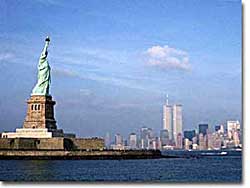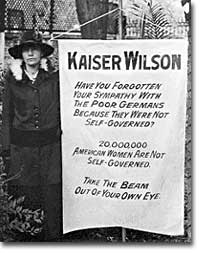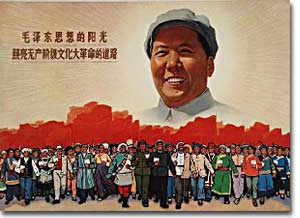13a. Comparing Governments

The Statue of Liberty is a symbol of freedom and democracy for people around the world.
No two governments, past or present, are exactly the same.
However, it is possible to examine the similarities and differences among political and economic systems and categorize different forms of government. One simple way to categorize governments is to divide them into democratic and authoritarian political systems.
Democracies
Many countries today claim to be democracies, but if the citizens are not involved in government and politics, they are democratic in name only. Some governments are more democratic than others, but systems cannot be considered truly democratic unless the meet certain criteria:

Whither democracy? It was not until 1920 — after decades of tireless protest and campaigning — that women were granted suffrage by the ratification of the 19th Amendment.
- Freedom of speech, the press, and religion. Democracies in general respect these basic individual liberties. No government allows absolute freedom, but democracies do not heavily censor newspapers and public expression of opinions.
- Majority rule with minority rights. In democracies, people usually accept decisions made by the majority of voters in a free election. However, democracies try to avoid the "tyranny of the majority" by providing ways for minorities all kinds to have their voices heard as well.
- Varied personal backgrounds of political leaders. Democracies usually leave room for many different types of citizens to compete for leadership positions. In other words, presidents and legislators do not all come from a few elite families, the same part of the country, or the same social class.
- Free, competitive elections. The presence of elections alone is not enough to call a country a democracy. The elections must be fair and competitive, and the government or political leaders cannot control the results. Voters must have real choices among candidates who run for public office.
- Rule by law. Democracies are not controlled by the whims of a leader, but they are governed by laws that apply to leaders and citizens equally.
- Meaningful political participation by citizens. By itself, a citizen's right to vote is not a good measure of democracy. The government must respond in some way to citizen demands. If they vote, the candidate they choose must actually take office. If they contact government in other ways — writing, protesting, phoning — officials must respond.
The degree to which a government fulfills these criteria is the degree to which it can be considered democratic. Examples of such governments include Great Britain, France, Japan, and the United States.
Authoritarian Regimes

Mao Zedong's position as authoritarian ruler of the People's Republic of China is glorified in this propaganda poster from the Cultural Revolution. The poster reads: "The light of Mao Zedong Thought illuminates the path of the Great Cultural Revolution of the Proletariat."
One ruler or a small group of leaders have the real power in authoritarian political systems. Authoritarian governments may hold elections and they may have contact with their citizens, but citizens do not have any voice in how they are ruled. Their leaders do not give their subjects free choice. Instead, they decide what the people can or cannot have. Citizens, then, are subjects who must obey, and not participants in government decisions. Kings, military leaders, emperors, a small group of aristocrats, dictators, and even presidents or prime ministers may rule authoritarian governments. The leader's title does not automatically indicate a particular type of government.
Authoritarian systems do not allow freedoms of speech, press, and religion, and they do not follow majority rule nor protect minority rights. Their leaders often come from one small group, such as top military officials, or from a small group of aristocratic families. Examples of such regimes include China, Myanmar, Cuba, and Iran.
No nation falls entirely into either category. It also dangerous to categorize a nation simply by the moment in time during which they were examined. The Russia of 1992 was very different from the Russia of 1990. Both democratic and authoritarian governments change over time, rendering the global mosaic uncertain and complex.







